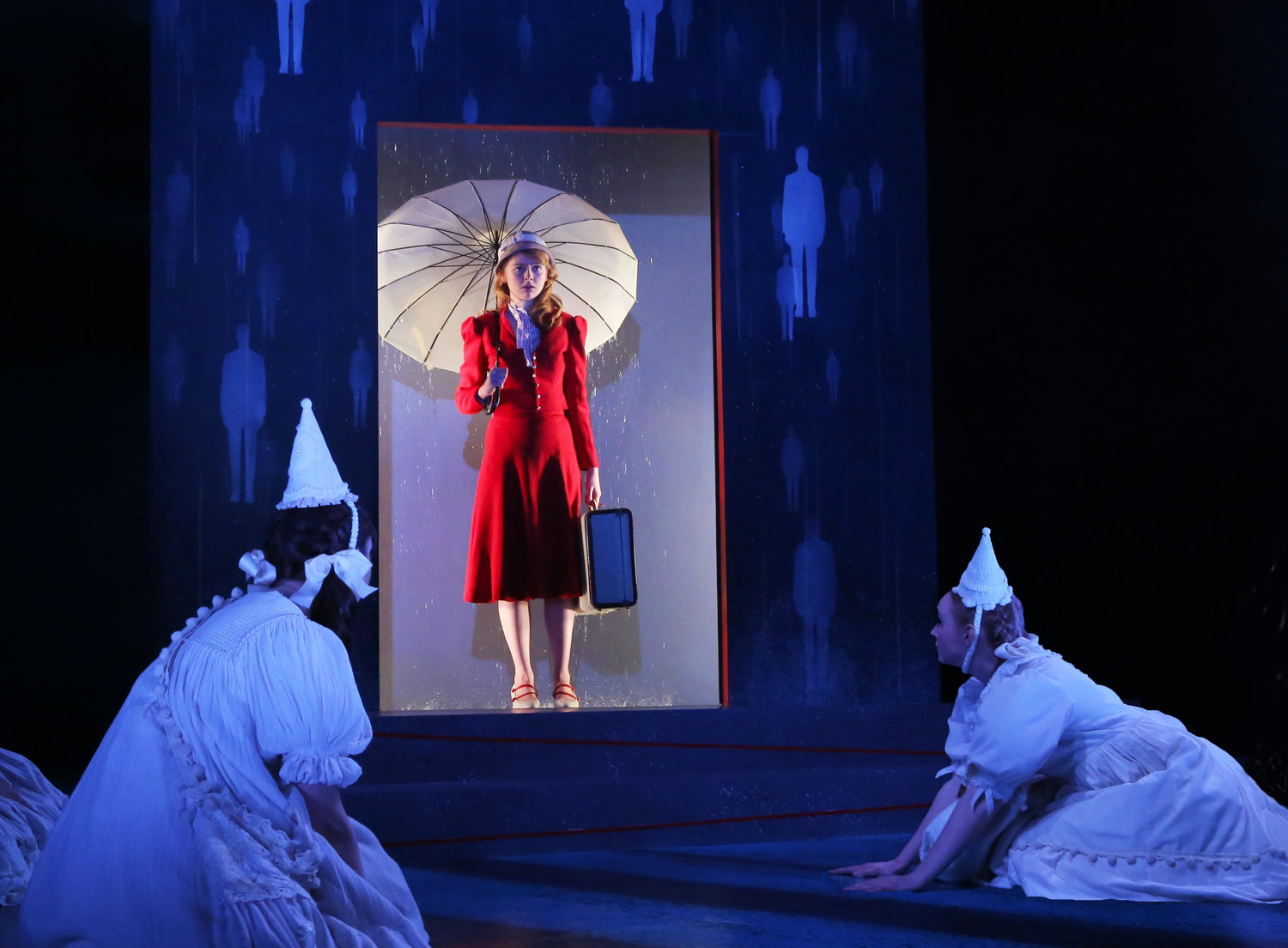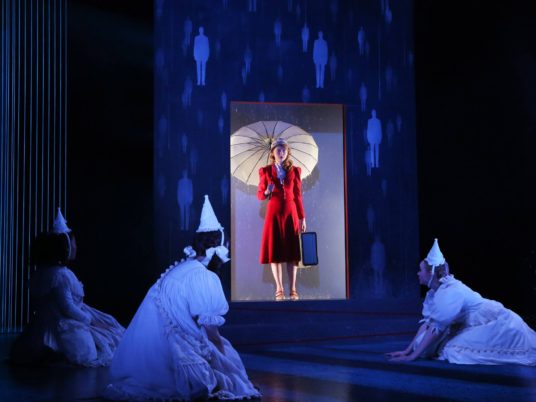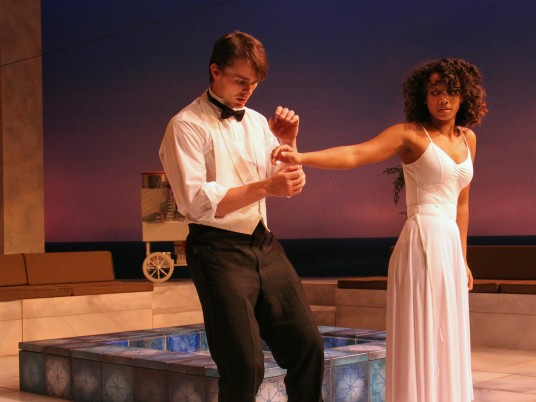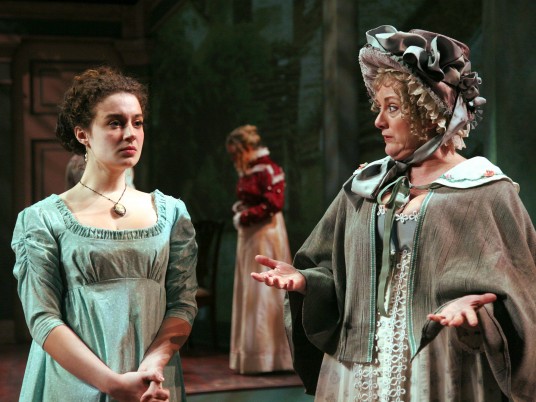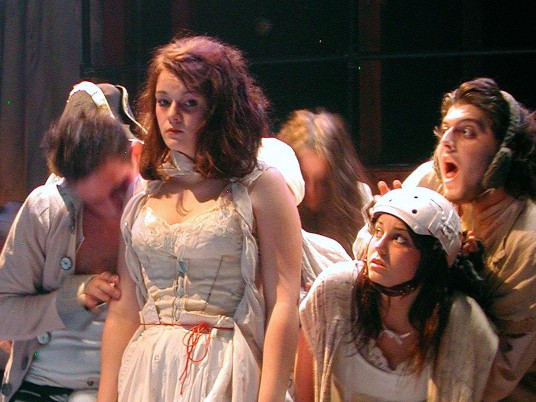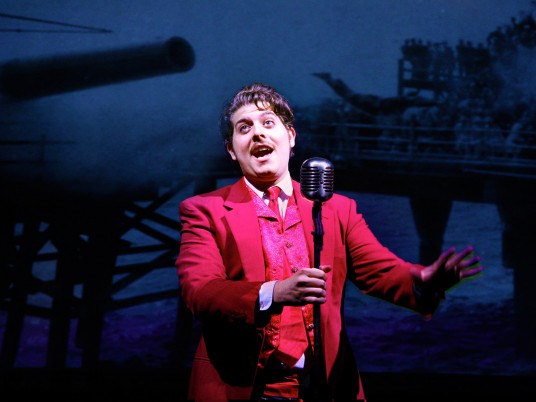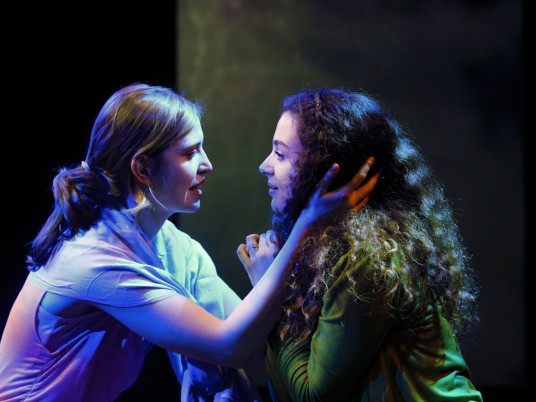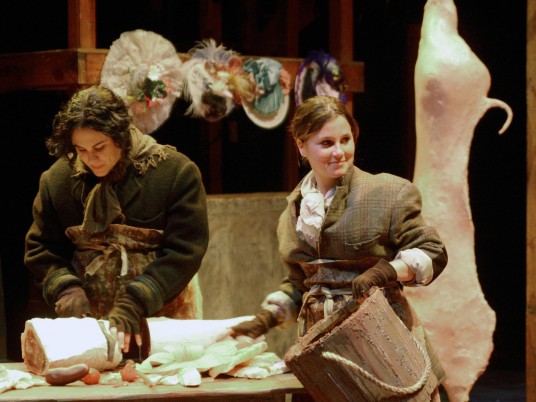Eurydice
Our production is an elegy – a poetic symphony of love, loss and memory with a whimsical nod to Lewis Carroll’s Alice in Wonderland. According to Chinese legend, a red thread of fate binds two people who are destined to be together. So it is in Eurydice. We explore the fragile connection of young love in this humorous and profound adaptation of the classic myth.
—Helene Kvale
Set Designer, Katherine Paik
Costume Designer, Jelena Antanasijevic
Lighting Designer, Danielle Verkennes
Sound Designer, Pornchanok Kanchanabanca
Assistant Director, Nathan Francis
Dramaturg, Emma Matthieu
Connecticut Repertory Theatre
Sarah Ruhl’s Eurydice is written in movements – a poetic symphony of love, loss, memory and rhythm. It is elemental, grounded in earth with two movements set in the Underworld, home of the Stones.
If Eurydice is water, Orpheus is air – the musician “too busy listening to his own thoughts.” The Lord of the Underworld is unpredictable fire, appearing as The Nasty Interesting Man and Child. Then there is the Father – Eurydice’s touchstone and her Tree.
The play is an elegy. It is also whimsical and surreal with a nod to Lewis Carroll’s Alice in Wonderland. Emotion is heightened, fleeting, childlike and profound. In our production, we honor the humorous contradictions, but also find the string-like connections. We explore the play as a meditation: (dis)harmonious, (off)balanced, influenced by the Japanese tradition of wabi sabi or the aspiration to accept imperfection and transience.
According to Chinese legend, a red thread of fate connects two people who are destined to be together. So it is with our young lovers. In the fragile, early days of their relationship, Eurydice is out of synch with Orpheus’ music. Paradoxically she will find her rhythm at the moment of her greatest loss. She will become reunited with Orpheus in the night sky as the Lyra constellation, reminding us that love transcends time and space. On earth we are left to cope with the tragedy of death, finding solace in the poetic space between the words and notes of music. In silence.
An extract from Helene Kvale’s First Rehearsal Notes | 2.6.17
When Orpheus plays, every animate and inanimate thing follows and his music can divert the course of rivers. -Ovid
We are connected to the universal through myths. They remind us of who we are, what we value, what we see as sacred. What genius Sarah Ruhl possesses, to reimagine the Orpheus myth as a piece of theater so fresh, so spare and rich, so surprising yet familiar. She takes a much-adapted story and modernizes it. She tells the classic tragic love story with a triangular twist.
By bringing Eurydice’s father into the picture, Ruhl is adding the perspective of the dead. By introducing an additional tragedy and a competing love, Ruhl shows us a woman struggling with her transition from young woman to wife as she moves from father to husband. Eurydice is out of synch, out of rhythm with herself and those around her.
Ruhl is a bold risk taker. She transforms Orpheus’ classic “look back” into Eurydice’s calling out. A momentary lapse of faith, judgement and rhythm sets in motion a tragic chain of events leading to eternal separation between the young bride and her new husband. Ruhl takes us beyond romantic love to show doubt and fear within young love. She dares to suggest that Eurydice may harbor a preference to stay with her father for eternity, rather than her husband.
Like the play, our production will be a poem, a meditation. It will be symbolic and abstract with movement characterized by Laban’s elements. But we will also depict a world where real people experience real emotions, unaware that they are living a tragedy. Our production will be powered by contradiction. Life is both beautiful and ugly. Death is everlasting yet comforting. Loss is painful yet sweet. Memory is soothing yet unbearable.
Our production will focus on the eternal and the abstract. We will focus on rhythm or lack thereof. We will highlight the moments between the breath and suggest that Eurydice and Orpheus will ultimately be destined to find each other in a constellation of stars. Their love is real and infinite. Unknowingly they both understand the importance of space between the notes, between the words and between each other.
The pervasive elements of water are incorporated in the play through the water pump and the raining elevator, an abstracted river of forgetfulness. When the perpetually thirsty Eurydice drinks from the water pump, she invokes the Nasty Interesting Man, thus connecting the Overworld to Underworld and bringing about her own demise. Characters are dipped into the river Lethe, to allow them to forget the pain of living without their loved ones.
String is another crucial element in Ruhl’s play. We want to use string to help the audience to experience the fragility and profundity of relationships, as though love is held together by a delicate thread. Orpheus ties a red string on Eurydice’s wedding finger to remind her of his love. The Father’s white string house exemplifies his love as well as his futile attempt to protect his daughter from danger. The upstage wall of string is the river of hate through which The Lord of the Underworld enters. It is also the wall that Orpheus breaks through at the climax of the play when he comes to retrieve Eurydice from the Underworld. It represents the strings on Orpheus’ guitar that can no longer protect their love when Eurydice calls out his name.
Our design will be minimalist, bold, and timeless, like the myth. There will be a hint of vintage: 1950’s for Orpheus and Eurydice’s Overworld and 1930’s for the Underworld. The color of water, blue, will feature heavily as will red, the color of vitality, blood, life and love.
